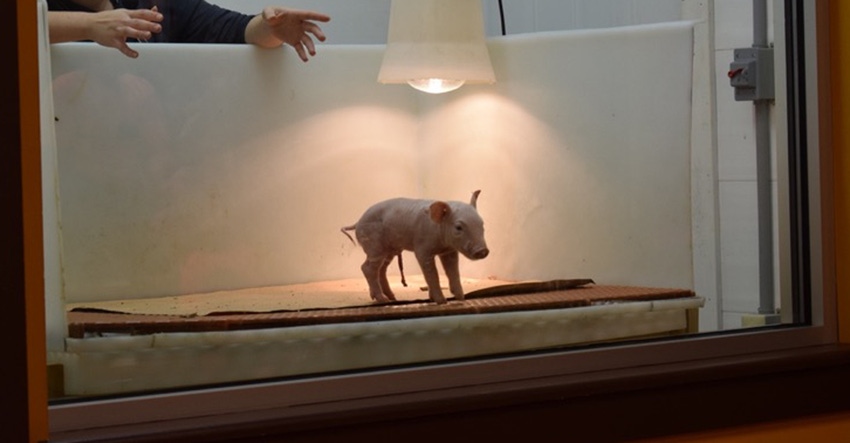December 21, 2017

By Sheradan Hill and Emma Martin
The agriculture industry has seen major shifts in consumer demands. There are numerous ways people begin making decisions, but how much has the agritourism sector influenced perceptions of agriculture?
Residents in Indiana, Illinois, Michigan, Ohio and Wisconsin mostly support the growth of animal agriculture in their areas, but many people continue to show concern with certain production practices, according to a Purdue University survey released in 2015.
The research team was interested in understanding why people go to agritourism events, what they learn while they’re there, and how their experiences might impact their perceptions of animal agriculture, says Candace Croney, director of the Center for Animal Welfare Science and a professor of animal behavior and well-being at Purdue.
What survey says
“We found that 69% of participants had visited a livestock operation [defined as a] pig farm, dairy farm and/or horse farm at some point,” Croney says. “Most people who responded felt that agriculture was an important industry. However, those who had visited livestock operations were more likely to have concerns about the impact of livestock operations on water quality in their counties.”
The survey also asked participants about the general types of tourism activities they visited. The highest attraction proved to be amusement parks, but national or state parks and farmers markets were close seconds. The survey targeting just Indiana residents found the same results.
“We aimed to better understand who attends agritourism events and for what purposes; [and] understand consumers’ interests associated with animal agriculture, including their levels of concern for production process attributes, such as animal welfare, and how these might relate to attributes like price and taste,” says Croney.
Agritourism in action
Fair Oaks Farms in Newton County, Ind., is known as the state’s premier agritourism attraction, with dairy, swine and crop exhibits accessible to the public. Visitors can download delicious pork recipes or take a bus tour through the freestall dairy barns. It is a place for hands-on learning.
“Agritourism is transparently showing where food comes from, in a fun way,” says Jamie Miller, Fair Oaks Farms attractions general manager. “It’s a celebration of agriculture.”
Miller has worked with Fair Oaks for just under 12 years, and believes the attraction offers a way for people to have a great time and gain firsthand experience of ag production.
Although many might not realize it, Purdue University hosts an agritourism event every Thursday between May and October. Students, faculty, staff and West Lafayette residents enjoy a wide array of options at the Purdue Farmers Market each week, and have a chance to interact with local livestock producers, such as Cleaver Family Farms.
“The atmosphere is incredible, and there’s nothing better than eating good food with good people right here on campus,” says Jasmine Hawthorne, a senior at Purdue. “Knowing where your food comes from is great and always comforting, but knowing I am helping a business from my own area is even better.”
While supporting local business is a rising notion, the 2015 Purdue survey states that only 2% of respondents regularly shopped at a farmers market. There were 82% who shopped at retail supermarkets, like Walmart, and 9% shopped at specialty stores such as Whole Foods.
Trends drive changes
What does this mean for markets? Experts say if consumers drive a demand for change and a large retail store shifts its guidelines, producers across the nation will have to make new decisions and change the way their operations function.
In the past several years, companies such as McDonald’s and Walmart have made guideline changes for how they will source their products. In September 2015, McDonald’s announced it would “transition to cage-free eggs for its nearly 16,000 restaurants in the U.S. and Canada over the next 10 years.” This decision was based on the changes in consumer expectations for animal welfare standards, company officials noted. The second-largest egg producer in the U.S., Rose Acres, based in Indiana, is erecting several new buildings devoted to cage-free egg production.
Various forms of agritourism may play an important hand in this changing consumer demand. Traditionally, agritourism has involved an in-person, hands-on approach, but advances in technology and social sharing have allowed individuals to share the story of agriculture virtually.
“In the future, we anticipate having customized photo filters similar to Snapchat,” Miller says. “And we currently encourage visitors to take photos.”
Hands-on is effective
However, the hands-on learning approach still dominates the agritourism scene, Miller notes. This in-person experience is important because even in the Midwest, there are many individuals who don’t have firsthand experience with animal agriculture.
In the Purdue survey, most participants rated themselves as a “somewhat or highly educated” food consumer or buyer; yet there were discrepancies with consumer expectation of farm sizes, Croney says.
For pork production, the survey found participants believed most pork comes from a farm that has far fewer pigs than is typical for U.S. pork suppliers. Having access to resources such as Fair Oaks Farms’ Pig Adventure could mitigate the concerns and misconceptions of production sizes.
It’s important to note that the sample taken included individuals who are slightly overeducated compared to the entire U.S. population, Croney adds. Compared to the U.S. average of 87% high school graduates, 98% of survey respondents had a high school education.
Survey participants also needed to have access to internet and an email account, as well as display adequate literacy.
Hill and Martin are seniors in ag communication at Purdue University.
You May Also Like




